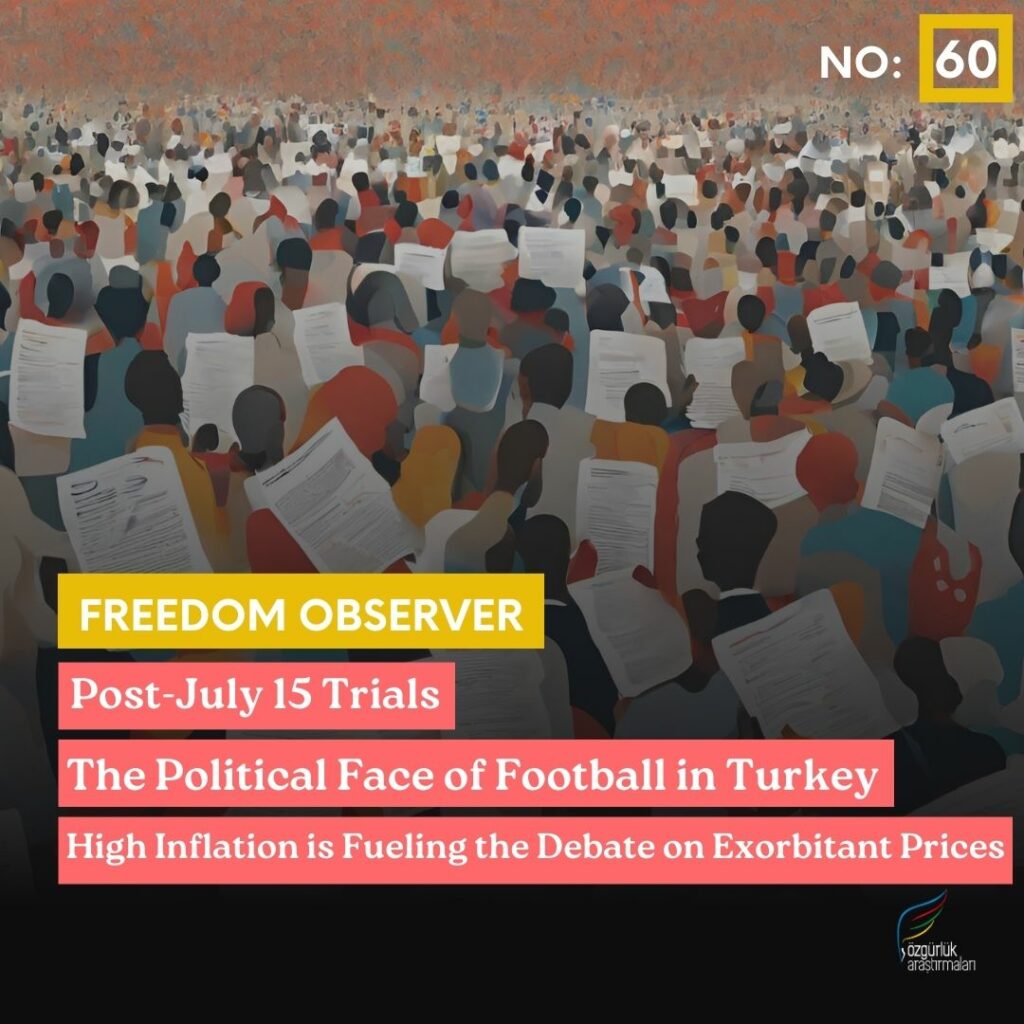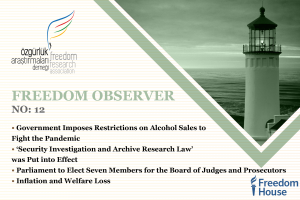
From Editor – in- Chef
Less than a month after the local elections, the ruling coalition partners, AKP and MHP, have reignited discussions on the ‘new constitution,’ a topic that has lingered on the national agenda for several months. This initiative is now prominently championed by Numan Kurtulmuş, the Speaker of the Grand National Assembly of Turkey (TBMM). Kurtulmuş emphasized that crafting an inclusive, democratic, and civilian constitution is a critical priority for the TBMM during this period. He ensured an open and transparent process involving all societal segments and commenced visits to the political parties in parliament to garner support for this initiative.
Despite public and opposition advocacy for a ‘libertarian, democratic, and civilian constitution,’ AKP and MHP’s primary objective with this initiative may not be to eliminate the current Constitution’s elements that undermine liberty, pluralism, and democracy. Instead, they focus on amendments that align with their partisan interests. MHP leader Bahçeli, in a statement regarding this matter, conceded that their real goal includes ‘reviewing the alliance system and addressing certain observed distortions that jeopardize political and democratic stability,’ and to some extent, embedding ‘national and spiritual values’ into the Constitution.
The ruling parties attempt to modify the existing presidential system to serve their coalition’s interests better. Lacking sufficient parliamentary seats to amend the Constitution on their own, they are seeking support from opposition parties, particularly the CHP. However, considering the AKP-MHP coalition’s track record over the past seven to eight years—characterized by the use of state power to dismantle democratic institutions, suppress dissent, and commit widespread rights violations—it is difficult to believe their intentions to draft a genuinely libertarian-democratic constitution are genuine.
The recent overtures of ‘détente’ by the ruling party may also be strategically tied to the opposition’s quest to secure its support for the constitutional amendment. A softened atmosphere of tension could make it easier for the opposition to consider the ruling coalition’s demands and proposals without prejudice. This apparent détente began before last week’s meeting between President Erdoğan and CHP Chairman Özgür Özel and was further supported by conciliatory statements made by both sides following the meeting.
Meanwhile, AKP MP Tuğrul Türkeş has notably contributed to the easing relations between the government and the opposition. Addressing the case of Osman Kavala, who has been unjustly imprisoned for years, Türkeş highlighted that this case has placed Turkey in a difficult position internationally and suggested that the issue could be resolved through domestic law. He criticized those opposing this view, indicating a high likelihood of Kavala’s release through a retrial. We hope that Türkeş’s statements are not merely tactical and that Kavala’s release will occur immediately.
However, there is a tragic development on the agenda which, if the ruling party is sincere in their statements on this issue, will weaken the feeling of relief that the possibility of “détente,” which is a good development, gives. According to a newspaper report, the European Union authorities are investigating the fate of the 6 billion Euros given to Turkey to help refugees. The relevant public institutions in Ankara refused to answer the EU’s questions about the fate of these funds. At the same time, the Ministry of National Education rejected a request for the return of 8.4 million euros transferred to it on the grounds of ‘irregular expenditure.’ According to the report, “the European Court of Auditors (ECA) has launched an investigation into the use of €6 billion for the basic needs of migrants. However, the auditors assigned for this purpose were unable to obtain information.
Although we, the citizens of Turkey, have grown accustomed to seeing resources earmarked for public use treated as ‘rent pools’ by the AKP government—freely distributed to supporters and plundered without oversight—it is deeply embarrassing on the international stage. The allegations, which I reluctantly report, highlight a troubling reality. If this article, which I am embarrassed to write, is accurate, even if Turkish society is willing to bear the heavy burden of this shame, our authorities must understand how such practices could negatively affect Turkey’s attempts to secure international funding vital to its economic recovery.
Finally, I would like to note here that the 30th vote for the election of the “First President” of the Court of Cassation, unfortunately, did not yield any results, a meaningful note for a supreme court that we have learned through the Osman Kavala case that it is very willing to interfere in matters that are not within its jurisdiction.
A. Rıza Çoban analyzes the July 15 coup attempt cases through the lens of international law and Council of Europe human rights standards, mainly focusing on a case involving a Turkish citizen who served as an international judge and was convicted of membership in FETÖ. Ömer Faruk Şen critically examines the interplay between football and politics in Turkey. Meanwhile, Caner Gerek discusses recent economic developments.
See you in the next Freedom Observer.
* Prof. Dr. Mustafa Erdoğan
Post-July 15 Trials
The European Court of Human Rights continues to hand down rulings on violations concerning the proceedings that followed the events of July 15. Most notably, on April 23, 2024, the Court ruled in the case of Aydın Sefa Akay[1] His arrest, along with the searches of his home and person, violated the European Convention on Human Rights. At the time of these events, Akay, a retired ambassador and former permanent representative of Turkey to the Council of Europe, was serving as a judge on the UN International Residual Mechanism for Criminal Tribunals, which handles appeals from the International Criminal Tribunals for Rwanda and Yugoslavia. The applicant served as a judge on the Rwandan Court from 2002 to 2011 and was appointed by the UN General Assembly to the Residual Mechanism in 2011. The UN Secretary-General extended his mandate for two years on June 1, 2016. On July 8, 2016, he was appointed as an Appeals Judge in the case of Prosecutor v. Augustin Ngirabatware by the Chief Judge of the Mechanism. While working remotely from Turkey, the applicant was arrested in the aftermath of the attempted coup d’état on allegations of membership in FETÖ. This arrest was part of a broader investigation into Foreign Affairs personnel. It was based on accusations of using the ByLock messaging app and discovering two books while searching his home.
The applicant’s lawyer argued for his release on the grounds that he possesses diplomatic immunity as an international judge, claiming that his arrest and search violated this immunity. On October 25, 2016, the UN Office of Legal Affairs sent a formal note to Turkey’s Permanent Mission to the UN, asserting the applicant’s diplomatic immunity under Article 29 of the Statute of the Mechanism and requesting the immediate cessation of his detention and all legal proceedings. However, the Turkish Ministry of Foreign Affairs contended that the applicant’s immunity was mission-specific and did not extend to actions against his state. Despite these international appeals, Turkish courts upheld the detention based on the Ministry’s stance, and the applicant was only released by the first instance court after a conviction. Subsequent appeals, including those to the Constitutional Court, were dismissed without substantive legal debate, relying solely on the Ministry’s assertion.
On January 17, 2017, the Mechanism held a hearing to address the applicant’s case; however, despite being invited, State representatives did not attend the hearing or make any legal submissions. Subsequently, on January 31, 2017, the Chief Judge of the Mechanism formally requested the Turkish Government to suspend all proceedings against the applicant and to secure his release by February 14, 2017. The Mechanism’s ruling highlighted that under Article 29 of its Statute, the judges’ immunity is considered absolute, as delineated in Chapter V of the 1946 Convention on the Immunities and Privileges of the United Nations, and can only be waived by the UN Secretary-General. However, the Turkish Government and Courts did not consider these requests, and the applicant was tried and convicted. this conviction was upheld by the Court of Cassation and became final. The applicant was arrested again after the finalization of the judgment and is still serving his sentence.
For the first time in its history, the European Court of Human Rights (ECtHR) ruled that the detention of an international judge was unlawful. The Court underscored that, as a UN judge, the applicant’s diplomatic immunity was personal, extending beyond official duties, and applicable to all states, including his own. Furthermore, the Court highlighted that such immunity could only be waived by the UN Secretary-General if justice so required. As a result, the Court determined that the applicant’s arrest and the searches of his home and person breached his inviolability, thereby finding that these actions unlawfully interfered with his right to liberty and security and his right to respect for private life as guaranteed by the Convention. Consequently, these actions were deemed violations of Articles 5 and 8 of the Convention.
The Court based its judgment solely on the issue of immunity, choosing not to address the allegations related to the ByLock messaging app. Ultimately, the applicant was awarded EUR 28,000 in compensation.
With this decision of the ECtHR, a new one has been added to the judgments on the unlawfulness of the post-July 15 trials. On April 29, the Court notified the government of 1,000 new applications related to the post-July 15 trials and stated that it did not want any defense other than factual issues. As long as the government’s indifference to comply with the ECtHR’s judgments continues, the violation judgments will continue. Each new violation decision means that the perception of lawlessness in the country becomes entrenched and entrenched. More importantly, it confirms that the judicial mechanism does not function pretty.
* Ali Rıza Çoban – Constitutional Lawyer
The Political Face of Football in Turkey
In Turkey, soccer transcends mere sport, becoming a phenomenon deeply entwined with political dynamics and mirroring existing power structures. Recent debates surrounding the Turkish Football Federation (TFF) have highlighted this complex relationship. In this bulletin, we will explore critical issues ranging from referee decisions and attacks on referees to controversial rulings by the TFF and the government’s politicization of football.
First, addressing the refereeing decisions that have become a weekly talking point is essential. Particularly in crucial matches, erroneous decisions have sparked significant dissatisfaction among fans and teams, raising public concerns about the impartiality of referees. Despite the introduction of the VAR system a few years ago to mitigate these controversies, it appears that VAR has, paradoxically, intensified debates over refereeing decisions. While VAR undoubtedly ensures fair judgment in many match situations, even with VAR reviews, incorrect decisions by referees now provoke stronger reactions than ever before. This discontent stems from club management and fans perceiving certain egregious decisions as deliberate bias against their teams, eroding trust in the justice of the game. Consequently, fans from nearly every team believe that football in Turkey is not played on an even field.
Referees face criticism not only for their positioning during matches but also for their decisions—or lack thereof—in situations that compromise player safety. A notable instance occurred during Fenerbahçe’s 3-2 victory over Trabzonspor when the referee chose not to halt the game despite the crowd throwing foreign objects onto the field. This decision set off a series of events that ultimately led to a post-match brawl involving Fenerbahçe players and Trabzonspor fans. It is essential to acknowledge that both the referee’s passivity and the inadequate response from security forces contributed to the escalation of the incident.
Furthermore, it is crucial to highlight the significant responsibility of the officials, particularly the Governor, for failing to implement adequate security measures at this historically contentious match, which has often been marred by unsportsmanlike behavior and the potential for violence. The shortsighted approach of the referee and security forces drew the ire of Fenerbahçe management and supporters on the grounds that the TFF had violated the conditions of fair competition, and an extraordinary general assembly was called. On April 2, an extraordinary general assembly was held, and Fenerbahçe’s management was authorized to address critical issues, including withdrawal from the league.
The situation that brought one of Turkey’s premier clubs to contemplate withdrawing from the league did not stem from a single incident. Particularly with Fenerbahçe, a series of events—most notably the match-fixing scandal—has led the club’s management and supporters to perceive that the AKP government and the Turkish Football Federation (TFF) have subjected the club to unfair treatment due to its ‘republican’ identity. However, there are numerous indications that the government favors Trabzonspor and that the Trabzonspor administration receives preferential treatment from the Turkish Football Federation (TFF). For instance, in a 2016 speech, Berat Albayrak noted, ‘We have five ministers from Trabzonspor… Those who know us understand how intensely we work behind the scenes for Trabzon and Trabzonspor.’ Additionally, various ministers, MPs, and mayors have publicly expressed their support for Trabzonspor.2
The government’s favoritism towards certain football clubs extends beyond mere verbal endorsements and includes financial entanglements. A complex and often opaque network of economic relationships between state institutions and football clubs—encompassing everything from stadium construction to debt deferral and municipal funding—positions some clubs more favorably than others. This intertwining of the commercial aspects of football with political interests transforms the sport into a multifaceted tool used for economic and political purposes. Consequently, the resulting mistrust in state institutions and the politicization of the sport are palpable on the football fields, transforming what should be apolitical competitions into arenas where politics are waged by other means.
* Ömer Faruk Şen – Ph.D. – Missouri University
High Inflation is Fueling the Debate on Exorbitant Prices
According to data released by the Istanbul Chamber of Commerce on May 1, April’s inflation rate increased by 78.81% year-on-year and 4.89% month-on-month. These figures indicate that, despite being a third of the way through 2024, inflation is not showing signs of a downward trend. Although the Central Bank’s new administration, which assumed office post-presidential elections, has implemented tightening policies, the persistent high inflation undermines its credibility. Nonetheless, the administration’s recent appointment before the local elections has fueled expectations that more substantive measures will be taken afterward. Additionally, the keen interest of foreign investors in the post-local election landscape fosters a somewhat optimistic outlook among financial markets during this post-election period. However, it’s important to note that public sentiment generally leans towards a contrary expectation.
While the Central Bank’s management aims to reduce the officially announced inflation rate to 36% by the end of the year, public trust in these figures remains low, with many believing the actual inflation rate is higher than reported. While it is familiar worldwide for households to perceive inflation as higher than official statistics suggest, the situation in Turkey in recent years has transcended mere perception. This discrepancy has created a divide between government and public inflation expectations. Despite this divergence, the government’s strategy of blaming businesses for exorbitant prices resonates increasingly with the public amid the prolonged period of high inflation.
In recent years, prices have surged to unprecedented levels due to a prolonged period of inflation, while household incomes have not risen comparably, leading to heightened scrutiny of pricing levels. Notably, the stability in the exchange rate lately has fostered a perception among citizens that current price hikes are not justified by cost increases. This is especially true for products that utilize low-cost inputs, where significant price increases lead the public to suspect businesses of opportunism. Indeed, social media is rife with posts criticizing these price discrepancies as disproportionate to the cost. However, defining what constitutes an ‘exorbitant price’ lacks a clear economic consensus and may contradict the principles of market dynamics. Recognizing prices as exorbitant could also pose risks to the functioning of the free market.”
In classical economics, prices are determined at an equilibrium point where supply meets demand. This point represents the price at which both producers and consumers are willing to transact. However, when prices deemed agreed upon by buyers and sellers are labeled as exorbitant, it implies these prices exceed what is considered reasonable or traditional limits. Such a definition presupposes a standard for what is conventional and sensible, yet it lacks clarity on how or where these boundaries should be established. Defining such a boundary suggests a belief in a ‘right price’ that contradicts the market-driven equilibrium price achieved through the natural interplay of supply and demand.
If the market-determined equilibrium price is not accepted as the correct price and a non-market standard is imposed, it invites public intervention in pricing. This leads to calls for government control over enterprise pricing through regulatory oversight, paving the way for market interventions. Such interventions disrupt the natural equilibrium of the free market, potentially causing production issues over time and, in the long run, necessitating a return to market-based pricing—likely at higher prices due to inefficiencies. Furthermore, price interventions strip the pricing mechanism of its ability to signal resource allocation efficiently. Consequently, persistently high inflation encourages further market interventions. A recent example is the April 30th directive in the Official Gazette, which mandates that the pricing of bagels must involve the opinion of the Ministry of Trade.3 It seems that we will continue to talk about exorbitant prices and the AK Party government’s interventions in the market in the coming periods.
* Dr. Caner Gerek
1Aydın Sefa Akay/Türkiye, no. 59/17, 23.04.2024, şuradan erişilebilir: https://hudoc.echr.coe.int/eng?i=001-233214
2https://www.karar.com/trabzonspora-destek-cikan-ak-partili-siyasilere-fenerbahcelilerden-tepki-1462592
3 https://www.resmigazete.gov.tr/eskiler/2024/04/20240430-12.htm





